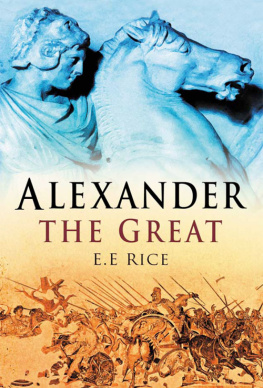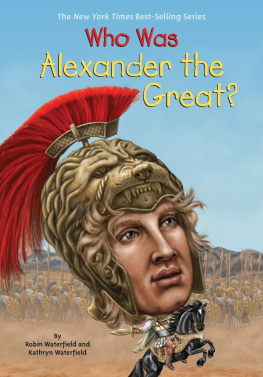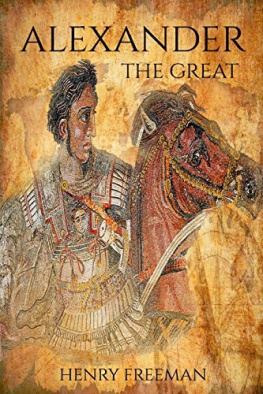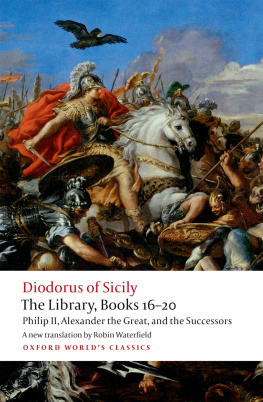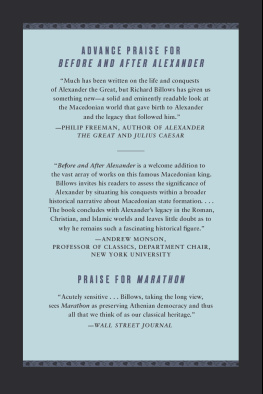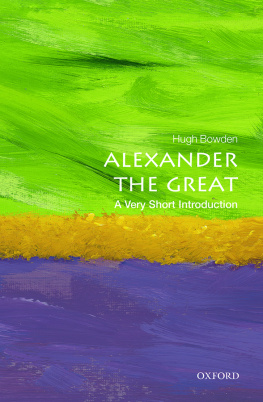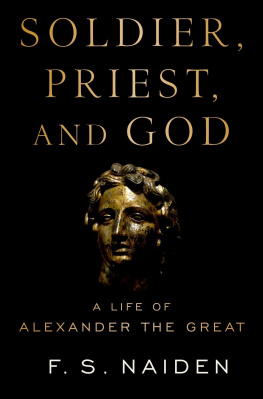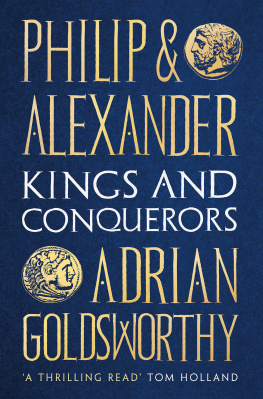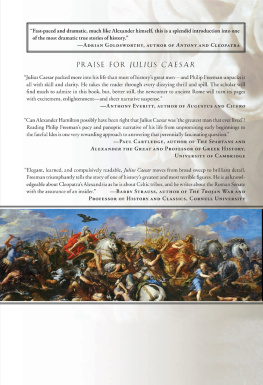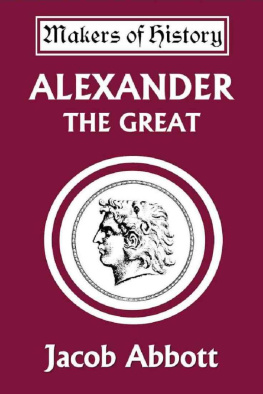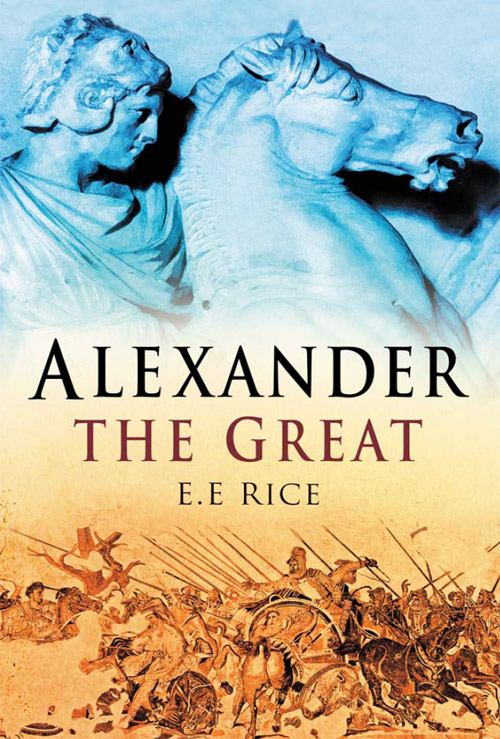Alexander
the Great
Alexander
the Great
E.E. R ICE
First published in 1997
This edition first published in 2004
The History Press
The Mill, Brimscombe Port
Stroud, Gloucestershire, GL 5 2 QG
www.thehistorypress.co.uk
This ebook edition first published in 2011
All rights reserved
E.E. Rice , 1997, 2004, 2011
The right of E.E. Rice , to be identified as the Author of this work has been asserted in accordance with the Copyrights, Designs and Patents Act 1988.
This ebook is copyright material and must not be copied, reproduced, transferred, distributed, leased, licensed or publicly performed or used in any way except as specifically permitted in writing by the publishers, as allowed under the terms and conditions under which it was purchased or as strictly permitted by applicable copyright law. Any unauthorised distribution or use of this text may be a direct infringement of the authors and publishers rights, and those responsible may be liable in law accordingly.
EPUB ISBN 978 0 7524 6838 9
MOBI ISBN 978 0 7524 6839 6
Original typesetting by The History Press
In Memoriam
Betty Nye Quinn
Professor of Classics,
Mount Holyoke College
obiit 29 January 1997
C ONTENTS
C HRONOLOGY
| 356 BC | Birth of Alexander the Great in Macedonia |
| 338 BC | King Philip II of Macedonia defeats allied Greek armies at Chaironeia |
| 336 BC | First invasion of Asia; King Philip assassinated at Aigai; accession of Alexander to the Macedonian throne |
| 335 BC | Alexanders campaigns in Thrace and Illyria; the destruction of Thebes |
| 334 BC | Alexander begins his invasion of the Persian Empire; the Battle of the Granicus river; the sieges of Miletus and Halicarnassus |
| 3343 BC | Conquest of southern Asia Minor; visit to Gordion near Ankara |
| 333 BC | The Battle of Issus |
| 332 BC | The siege and capture of Tyre and Gaza |
| 3321 BC | Alexander conquers Egypt, founds Alexandria, and visits the Oracle of Ammon at the Siwah Oasis |
| 331 BC | The Battle of Gaugamela |
| 330 BC | The burning of Persepolis; death of the Persian Great King Darius III; murders of Philotas and Parmenio |
| 3298 BC | Campaigns in Bactria and Sogdiana; the capture of Bessus; the murder of Cleitus; the Royal Pages Conspiracy; the arrest of Callisthenes; the revolt and death of Spitamenes |
| 327 BC | Alexander marries Rhoxane; the invasion of India |
| 3265 BC | The Battle of the Hydaspes against Porus; the mutiny on the Hyphasis river; the voyage down the Indus; the campaign against the Malli |
| 325 BC | The march across the Gedrosian desert |
| 324 BC | The mass marriage at Susa; the mutiny at Opis; the death of Hephaistion |
| 323 BC | The death of Alexander the Great at Babylon |
I NTRODUCTION
AND S OURCES
I t is a daunting task to write a biography of Alexander the Great. In the first place there is much that is not known about one of the most famous figures in history. In the second place, the heavily documented scholarly bibliography which already exists due in part to the endless speculation caused by our lack of information is huge and constantly growing. In this Pocket Biography I have therefore attempted to present a short account of Alexanders life based on a synthesis of academic material known to me, which is aimed at the intelligent general reader interested in the facts and problems which I and other ancient historians think are important to the understanding of this enigmatic figure. Of necessity I have had to be ruthlessly selective within the confines of this series and would never claim that this book is comprehensive or intended to be so. It is emphatically not a documented account of Alexanders military campaigns. I hope none the less that this volume may go some way to dispel various myths commonly held about Alexander by those who have not had the opportunity to delve behind the many strictly popular writings about him which exist.
The Sources
That we know anything at all about Alexander is primarily due to the ancient literary sources which discuss him. Many university students in my experience would gladly pass over a section on source criticism, the analytical study of historical sources to determine the worth of what any of them say. However, this is an essential part of the study of history, and the study of Alexander poses a major source problem. Many, many histories of Alexander were written in antiquity (he was a source of fascination to the ancients as well as to moderns), but most are known only by title or in fragments because of the circumstances of historical survival. These included eyewitness accounts by men who had accompanied Alexanders expedition (the so-called primary sources), who were at least in a position to tell the truth about the parts of the campaigns they knew about in so far as they understood it, although bias or even malice might have crept in. A notable example was Callisthenes of Olynthus (a Greek city in Chalkidiki in Macedonia), a relative of the philosopher Aristotle, who accompanied Alexanders expedition as its official historian. It is often said that he was the Homer to Alexanders Achilles (a reference to the epic poem the Iliad which celebrated the Trojan War and the Greek hero Achilles, by a poet traditionally known as Homer). There were also later writers who both made use of these eyewitness accounts and drew upon the wealth of popular stories which quickly grew up about Alexander.
The most reliable of the latter group (so-called secondary sources) form the basis of all modern histories of Alexander the Great. The best known of these writers is Lucius Flavius Arrianus, Arrian in anglicised form, who was a Greek from the Roman province of Bithynia (an area of modern Turkey near the south-west corner of the Black Sea). Arrian was a prolific historical writer with a busy and successful political career in the Roman civil service. Although his exact dates continue to be debated, he lived in the last decade or so of the first century AD throughout the first decades or more of the second century; that is, more than four hundred years after Alexanders death, and therefore without any personal knowledge of his subject. His six-book history of Alexander is known in Greek as the Anabasis (literally an expedition up into a country), and provides a coherent, chronological, and largely convincing description of Alexanders campaigns. Arrian states that he based his history on two main eyewitness accounts available to him: that of Ptolemy, Alexanders boyhood friend in Macedonia and later a general (subequently to become King Ptolemy I of Egypt), and that of a man named Aristoboulos, usually considered a civil engineer of some kind. We do not know why Arrian chose these sources nor how good they were. Since other Alexander historians do not use them, we have no independent evidence for their worth or otherwise. He also includes various stories or tales (as he calls them) about Alexander, the origin of which remains obscure. Much of the difficulty in interpreting Arrian arises from this lack of knowledge about his sources. Arrian has been criticised in many areas, but despite the problems of his sources and his late date, his

